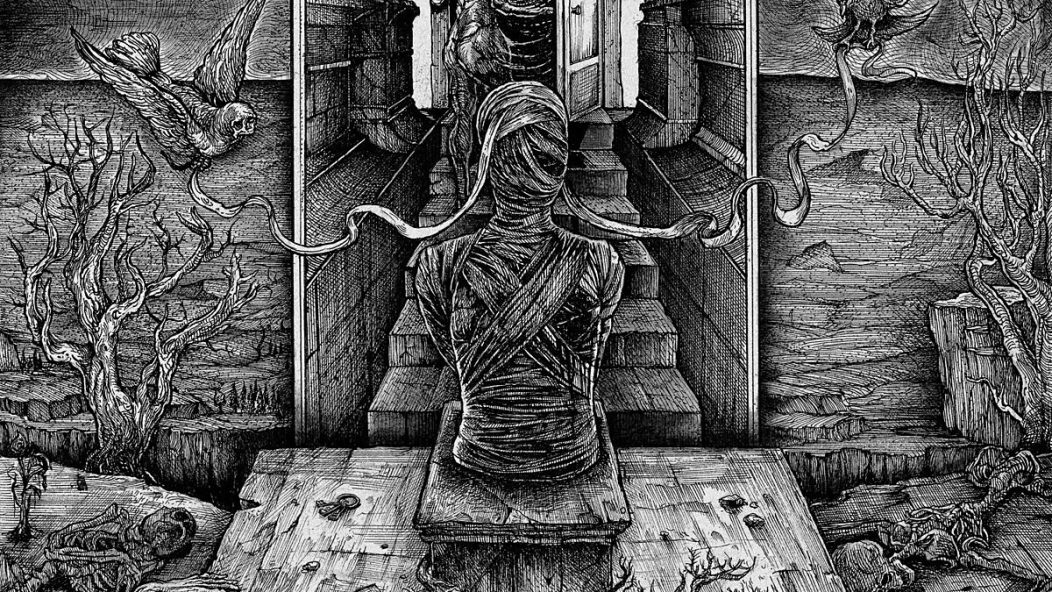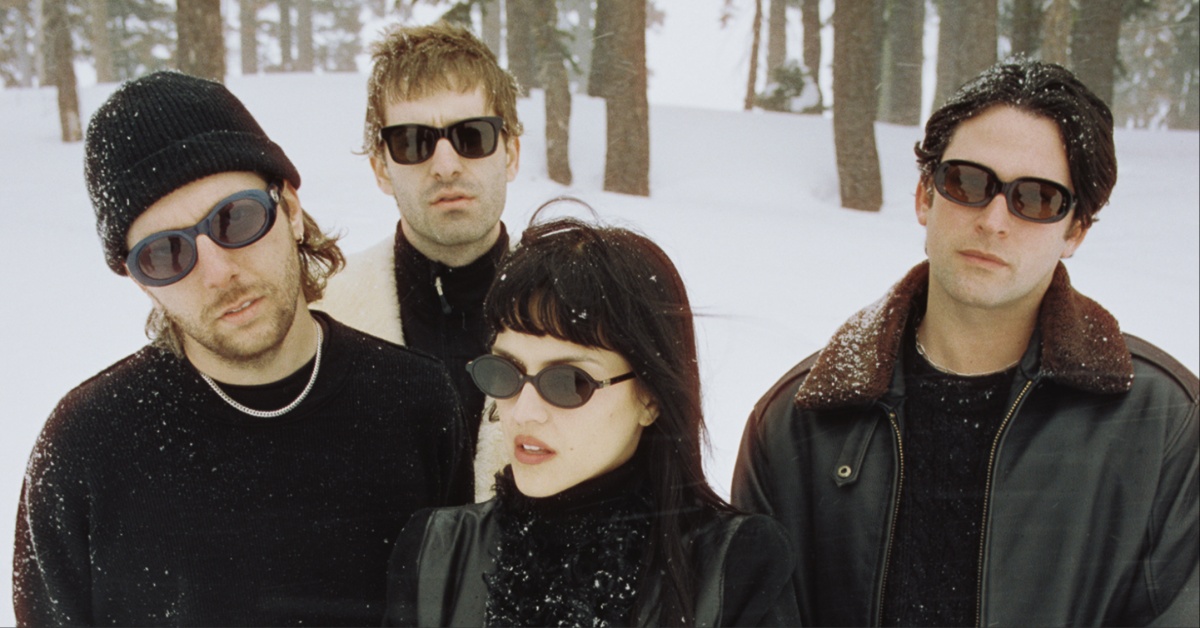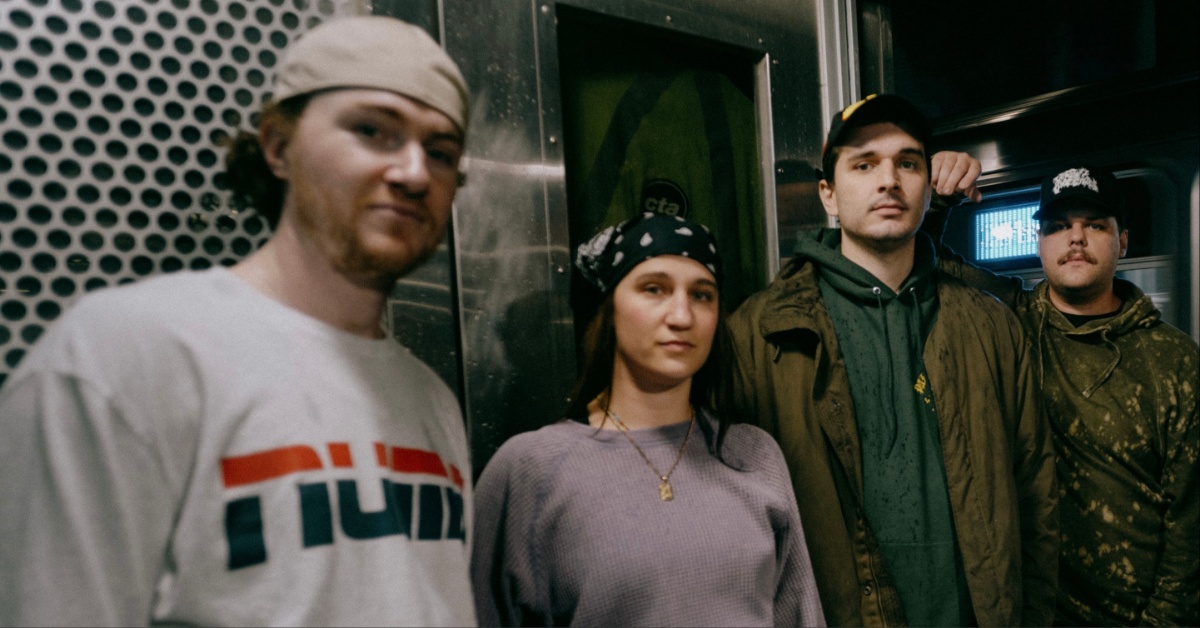
Mo'ynoq Draw from "A Place for Ash" For Their Distressing Black Metal (Interview)
Pain exists in both the spiritual and physical realm, with the former being a transcendent agony that disrupts one’s sense of being while the other rises from freak accidents like breaking your leg while attempting a backflip on a trampoline. Mo’ynoq’s A Place for Ash deals with both. It’s a frustrated album that tells opaque tales of overcoming adversity, settling disputes, and exhuming guilt, but you wouldn’t guess that from the tone that bassist Devin Janus and drummer Justin Valletta adopt when speaking about it. The pair brim with joy as they detail A Place for Ash’s labored path during our Zoom chat. Their excitement lies in discussing what they worked through to produce their second album, a record in which the North Carolina four-person black metal outfit are lethal and severely emotional, owing to their improved cohesion and the numerous hurdles they overcame just to piece it together. As they describe it, “everything that could’ve gone wrong, did.”
For starters, Valletta broke his leg early on in the record’s production in the aforementioned trampoline accident. This gave the other three members, Janus, Donald Boyd, and Logan Holloway, almost an entire year to rehearse the songs, albeit without Valletta. Nevertheless, they pushed through physical barriers, and their resolve presents itself in the form of A Place for Ash’s muscularity. It is an anabolic album with an atmosphere built with sweat and effort rather than pacing and effects. It’s opaque at first, slightly flighty, in that you can’t put your finger on what distinguishesA Place for Ash from the pack rather than its quality. However, Mo’ynoq’s physicality soon presents itself, and the group’s analog recording process shines through.
They employed three different vocalists and pushed themselves to manually adapt their equipment to achieve new sounds. Skeptics may see both of these traits as gimmicks, but they’re tantamount to Mo’ynoq. Neither is implemented as an exercise nor do they feel superfluous. Opener “Penance” is a full-throated display of vocal mastery. The three vocalists take turns at the foray’s forefront while rotating supporting duties. The recording set-ups, which Janus and Valletta discuss later, provide a fuller body to A Place for Ash. They generate space and depth in the mix that’s heartier than what could’ve been accomplished with digital production.
A Place for Ash is attention-grabbing rather than attention seeking. The division of labor between vocalists and their analog trickery aren’t overtly apparent, even though they give the album its own particular chew. They amount to subtle buffs to Mo’ynoq’s immediacy. Although A Place for Ash concludes with a prolonged epic, Mo’ynoq play in the present moment rather than building towards the future. The most important moment on the record is the moment that’s playing at any given time, whether that’s the scalp-incinerating solos or the grieving riff that commences “Effigies Adorned in Fire.” Balancing that immediacy with these longer song structures is not an easy feat although the group make it look as effortless as recording drums with a broken freakin’ leg. Kurt Angle would be proud.
…
A Place for Ash released on September 23 on the group’s Bandcamp.
…
…
I’ve heard that you guys said before that this process was more democratic and peaceful than your last album. Can you elaborate on that?
Justin Valletta: We’re gelling much better.
Devin Janus: We’ve gotten into a rhythm where we know each other’s quirks. We know how to navigate each other’s rhythms cause everyone is protective of their art in their own certain way. You want to have a level of tact when you’re going to modify or butcher someone’s riff, you know.
It can be tough if someone is suggesting changes to what you hold dear in art.
Valletta: It can be difficult to communicate it that way, instead of “Dude that kinda fucking sucks.” It took us a while to be mindful.
Janus: To learn each other’s love language.
Thematically, was there stuff you were writing about on Dreaming in a Dead Language that you wanted to further explore on A Place for Ash, or that you wanted to revisit with a set of mature eyes?
Valletta: I haven’t thought about it that way, but you can. That’s a good way to look at it. Thematically, Dreaming in a Dead Language has a lot to do with personal transformation. It’s not that A Place for Ash doesn’t, but it’s more about evolving. For example, “Penance” is about purging guilt, and the album has a lot of evolutionary themes throughout. Growth as opposed to transportation.
On that note, I wanted to touch upon the guilt themes and how you brought them into A Place for Ash.. What was it like to reflect upon your experiences through music’s lens?
Valletta: That’s a loaded question (laughs).
Janus: in a lot of ways, the place that we were all in personally during Dreaming in a Dead Language resolved in a lot of ways leading to a tone of acceptance or the ability to move forward and learn from things as opposed to dwelling on stuff. There’s a distinction between the two.
Were they issues that you had to go through individually?
Valletta: I wouldn’t even say it was all necessarily confined to the timeline from Dreaming in a Dead Language to A Place for Ash, it was our whole lifetimes. A common thread that connects all of our stuff is that it comes from suffering. It’s an outlet for us to deal with the things that can happen in anybody’s life. Everybody has their own story. I don’t want to speak for everybody, but it’s therapeutic for me to play blast beats…with the lights off (laughs).
Janus: Justin even wrote lyrics that we worked into the songs with names, so there’s a solid amount of equity among band members when it comes to injecting their own personalities or ideas into the songs.
Music like this deals with such heavy topics. Even though depression and suffering are common subjects, relatively speaking, it’s the experience you go through that defines your take on it.
Janus: Exactly. I think in a broader sense, those are things that peop[le can relate to on some level cause we don’t get into the specifics of the lyrics. We don’t make a habit of publishing our lyrics so we don’t have to go down that hole. In a nutshell, it’s not that we’re targeting certain events so much as we are the specific emotive response that comes from things that make you angry or depressed.
That’s what matters more – the response. The human experience is charting how you react to certain stimuli. I know weakness was an inspiration for your band name, so I wanted to ask if weakness was a founding principle or a jumping-off point for your band?
Janus: I’d say it’s more like fragility rather than weakness, but it’s hard to classify exactly.
Valletta: There was a bunch of thought that went into the name, and you could consider weakness as part of that, but it was the desolation and sadness of what took place there. The fall from grace [in Mo’ynoq] was monstrous.
[Author’s note: Mo’ynoq is located in Uzbekistan and was formerly the country’s only port city and thus a national fishing center. Soviet interactions in the 1960s dried up the Aral Sea, where Mo’ynoq drew nearly all of its water, eventually giving way to massive pollution in what water remained. Many of the city’s residents died due to the water’s toxicity.]
Janus: To us, in a way, it embodies the things we were trying to convey, and it was much better than what we had on the board.
Valletta: The bleakness of the situation was the biggest thing that attracted me to it, at least for me.
There’s plenty of bleakness on A Place for Ash. Specifically, I think of the opening minutes of “The Beast That Mourned” and the fact that it forces you to sit there, which I appreciate because it’s different from a typical gentle build-up. You’re stuck in that distorted riff. I loved how you approached your songwriting in those regards.
Valletta: Thanks. It’s an ambitious one for sure. I love how hollow the beginning is.
Janus: A lot of that came from Justin’s direction. He’d say, “Make it bleaker. I want to feel like a little old man in a dark room and it’s raining.”
Valletta: With no one else around and he’s fucking crying. In the studio, we got a cool sound out of a Gibson something-or-other. We set it at one side of the studio and we mic’d it from super far away. It made the sound we were looking for on “The Beast That Mourned.” It was rough on the edges but had a little bit of bite.
Did you find that since you had more time in the studio you were able to pull off more tricks like that?
Valletta: Kind of, we didn’t have too much time though. We were only there for a week, but in our practice space we have some equipment that we use for demos. Our friend Chris out of Greensboro owns a studio and this was our third time working with him. We had a plan for what we wanted to do when we went in, which gave us a bit of time for experimenting especially with regards to stuff like that; the intros, the mic placements, the drum sounds, shit like that.
Janus: We did do more experimental stuff like with the mist. There’s reverb in the guitar tones that sound normal but a lot of the overall room and track reverb came from running those through an array of amps with another set of mics set up at the back of the room. It was an analog way of doing reverb that gave us a really cool effect.
That brings me back to the vocals. I was interested to speak with you about how you recorded and balanced three separate vocalists.
Janus: We mostly used the same mic. In practice, we have different mics out of necessity.
Valletta: In terms of arrangement we used call-and-response, cause everyone besides me sings vocals. Everybody has their different voice capabilities and how we mix and match them, so we spend more time considering those things.
Janus: We also do a great job of not being too possessive. For example, someone could be working on a riff during practice and later on someone may want to work with it. Very rarely do we turn down those requests. The difference was that with Dreaming in a Dead Language, Logan didn’t want to do vocals because he’d been doing vocals all the time with his old band. Then, through our releases, he’s gotten more involved on those sides of things. For the most part, we write our parts separately so that we can come together and shop it when we’re reading to demo it in the shop.
Another thing I wanted to ask about is your massive lead guitar solos. I’m so happy that they came back to A Place for Ash because they were on Dreaming in a Dead Language and they shattered the bleakness. It’s not that they’re out of place, but they’re unexpected. I wanted to pick your brains about those.
Valletta: I don’t know if we’re the most qualified to answer this question. In terms of how I feel about it, I’m glad to hear that you were surprised. That’s an indication of something good; It’s more than one-dimensional, even from song to song. There are some rippers in there but there are some bleak moments as well. When our guitars are doing that, we’ve tried to give the listener a good payoff because we want to take them places.
Janus: On the subject of payoffs, we wanted “The Beast That Mourned” to have its own sort of payoff. Maybe not with one specific part, though I guess the solo is pretty sick, but we tried to take you on a journey with ups and downs and lefts and rights. We wanted to show you the scenic route.











